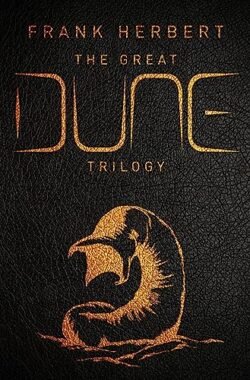“The Great Dune Trilogy” encompasses the first three novels of Frank Herbert’s seminal science fiction series: “Dune,” “Dune Messiah,” and “Children of Dune.” Set in a distant future where interstellar travel is facilitated by the spice melange, found only on the desert planet of Arrakis (Dune), the trilogy explores themes of politics, religion, and power through the saga of the Atreides family. The narrative unfolds in a complex universe dominated by feudal houses, the mystical Bene Gesserit sisterhood, and the desert Fremen of Arrakis. Central to the story is Paul Atreides, whose journey from noble son to the messianic Muad’Dib reshapes the galaxy’s socio-political fabric. Herbert’s work is celebrated for its intricate plot, deep philosophical underpinnings, and the ecological and cultural detail of the world he created.
Character Analysis
- Paul Atreides: Paul Atreides, also known as Muad'Dib, is the protagonist whose transformation drives the trilogy's narrative arc. Born to Duke Leto Atreides and Lady Jessica, a member of the Bene Gesserit, Paul inherits a legacy fraught with danger and expectation. His journey from a young nobleman to the leader of the Fremen and eventual ruler of the Known Universe is marked by trials that test his morality, identity, and vision for the future. Paul's character explores themes of destiny, leadership, and the burdens of prophecy.
Themes and Analysis
- Power and Politics: The trilogy delves into the mechanisms of political power, the manipulation of populations through religion and myth, and the struggles between imperial, feudal, and tribal systems of governance.
- Ecology and Environment: Herbert places a strong emphasis on the ecological system of Arrakis, its influence on culture, and the broader implications of environmental stewardship and manipulation.
- Philosophy and Religion: Through Paul's journey and the broader narrative, Herbert explores philosophical questions about predestination, free will, and the construction of myths, integrating elements from various Earth religions to create a rich theological tapestry.
“The Great Dune Trilogy” stands as a monumental achievement in science fiction, offering a narrative that is as thought-provoking as it is entertaining. Frank Herbert’s ability to weave complex themes into an expansive, detailed universe has made the series a touchstone in the genre, influencing countless works and discussions in the decades since its publication. The trilogy’s exploration of the human condition, set against the backdrop of a meticulously crafted future, continues to resonate with readers, cementing its place as a classic of science fiction literature.
If the summary caught your interest,
Consider reading the full book on AbeBooks.
Explore this book on AbeBooks
